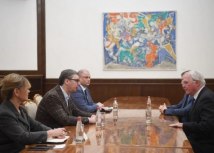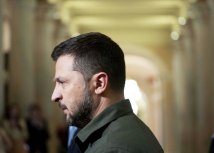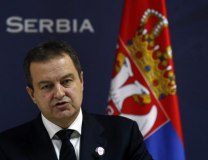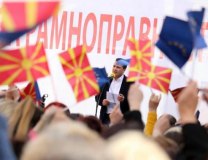Issue of missing mustn't be used in daily political battles
Veran Matic, the special representative of the Serbian president for resolving the issue of the missing persons with Croatia, has told the daily Danas in an interview that the issue must not be used in daily political battles.
Source: Danas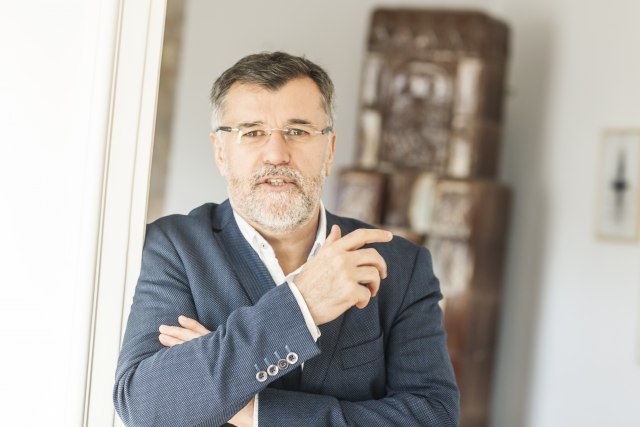
Why did you accept the position of the Special Envoy of the President for resolving the issue of the missing persons with Croatia and what this appointment means to you?
VERAN MATIĆ: In my engagement so far, I had a chance on numerous occasions to talk to the families of the missing and killed, and I can only try to imagine the levels of their pain and suffering. My sole motive was that if there is a possibility for me to help resolve those cases of missing persons, and thus diminish their pain with new findings, then I have certain moral obligation to do what I can.
When B92 production prepared the shooting of documentary Vukovar – Final cut, I had considered how to make a documentary that would have the same credibility, satisfying quality and factual reliability, so that it could be accepted on both sides, in Croatia and Serbia, in the similar way, and thus contribute to establishing unique standard when it comes to the tragic destiny of the citizens of Vukovar and the whole region, as well as the city itself.
We had decided to make a team of five journalists from Serbia and Croatia, respectively, headed by one of the best journalist in the region, and in Europe and internationally, Dragutin Hedl from Osijek. We had carried out joined investigations for thirteen months, along with directing the documentary, which was entrusted to Janko Baljak. The first premiere was in Zagreb, in the presence of representatives of the families of the missing and killed persons. It was very moving. Without any serious negative reactions.
The same goes for Belgrade. We had shown it very often, and according to our assessment, more than 2 million viewers had seen the film. Afterwards, we made a documentary about Lora in a similar way (coproduced with Nenad Puhovski), and several other documentaries... I believe that joint work of the people that are linked with mutual trust can greatly contribute to humanitarian goals, which cannot be realized due to diverse reasons trhrough regular institutions. I had accepted this position when I was informed that Ivica Vrkic, mayor of Osijek, was appointed Envoy of Croatian President Grabar Kitarovic. I know Vrkic very well, as we had already cooperated on similar projects. I believe that we can cooperate without any burden or interest, and that we can build broader support to the cause that is among most significant for both nations.
You stated that you are honored to be in a position to contribute to resolving significant issues for the families of the missing persons. In what way you plan to do so? Do you have any plan for the forthcoming period?
VERAN MATIĆ: I don't regard our mission as replacing the work of the Commission for the missing persons of the Republic of Serbia and the Office for the imprisoned and missing persons of the Republic of Croatia, but more as certain upgrade of the whole process, through the cooperation with all the actors, from the Commissions to the Associations of the missing persons on both sides, along with some personal initiatives. I think that it is impossible that only state commissions deal with such significant issue... It is necessary that we join forces, starting with state institutions, to NGOs, and especially associations of the families of the missing persons, and that we gain mutual trust and devotion to unique civilizational goals. (Families of the missing persons have to feel that the rest of the community in which they live, and societies on the whole, are aware of their loss and the troubles they face, thus offering them long term help. When families participate in the processes of resolving the issues of the missing, they will try to use all the power they had left to develop something new, stated Andras Viger, former member of MKCK for the Balkan).
Generally, I think that it is very important to collect all the data gathered by the Commission and associations and many other institutions that deal with this issue on the national levels, and then we need to make joint list of the missing between Croatia and Serbia, without insisting on who should end up on what national list. A unique list would allow all the data to be gathered on the same place, including all the data on anyone from the list, from all sources. In this way, we would diminish „buzzing“ in communication, guessing the numbers of missing persons and constant abuse of this issue in daily politics and for other purposes.
I deeply believe that the issue of the missing should not by any means be used in daily political battles, not only due to the respect of the victims and their families, but also as it will slow down or prevent the process of finding the missing ones, their identification, etc. In doing so, we do injustice to the victims and those who want to find peace after more than two decades.
I believe that Mr. Vrkic and I will devote ourselves to the precise cases, with the agenda to come up with the results at the earliest possible opportunity.
How do you perceive current relations of Serbia and Croatia, and to what extent would your appointment affect normalization of the relations between those two states?
VERAN MATIĆ: I believe that this appointment expresses desire that resolution of this issue becomes primarily humanitarian issue, and to find mechanism that would be immune to daily political incidents, to create channel that would be functional all the time. Certainly, resolving the issue of the missing persons is one of the most vital elements for establishing trust between the two states. My colleague Vrkic and I do not belong to leading structures of our countries, but I am certain that we share the same attitude when it comes to the “missing persons’ issue”, meaning that this is the point that calls for prevention of any conflict or daily political games.
All those involved in resolving this issue have to be fully protected from the issues that have nothing to do with the processes that should lead to the resolve of the destiny of the missing persons, which would slow them down or blocked their work altogether. Moreover, I think that it is necessary to improve and increase the capacities of the institutions that deal with this subject, when it comes to both manpower and means. I think that this engagement can contribute to improving bilateral relations. But this process should be implemented outside of political agenda, even if it is about improving interstate relations. Simply, we need to create mechanisms for solving this problem without having additional motives, humanitarian motive being the main goal.
According to you, can Serbia and Croatia face with the past in due course, especially if we have in mind the fact that both sides regard their war criminals as heroes?
VERAN MATIĆ: Regarding war criminals as heroes always returns as boomerang to the nations that do that. It is unacceptable that this becomes model for the new generations, revisionism is simply inadmissible when it is linked with historical events for daily political purposes. I am confident that due to different criteria in one state someone is being considered a hero, and in the other state as war criminal, and there are no first-instance verdict for the committed acts, still it is not appropriate to celebrate and regard those people as “heroes”.
REKOM initiative presents the best test. We have consent of Serbia, Macedonia, Montenegro and Kosovo, but we still wait for the consent of Croatia and Bosnia-Herzegovina for the consensual agreement on forming Regional Commission for determining the facts on war crimes and other severe violations of human rights committed on the territory of former SFRJ (Socialist Federal Republic of Yugoslavia) from January 1, 1991, to December 31, 2001. This Initiative backed by hundreds of NGOs and more than 600.000 signatories from the region of former Yugoslavia, still has no adequate support that would lead to establishing this vital institution, including the support of the international community. Exactly on the London Summit of Berlin Initiative we missed the chance to adopt this initiative and allow it to start working that would be basis for dealing and facing with the past.
However, this process is not simple. I had organized two international conferences treating this issue, back in 2000, and 2001, with the representatives of all successful and unsuccessful models of facing with the past – from Germany, South-African Republic, Argentina, etc. Every example is unique. I regret the missed chance to make that process possible back then, that would lead to the reconciliation on all sides, with the support of international institutions and with the efforts of our own individual and NGO initiatives. Ruling parties also simulated similar initiatives that only compromised the efforts to do something at the later stage.
I remember Zarko Puhovski saying on one of such gatherings: prior to reconciliation, we must experience agitation.
These days, I’ve been frequently asked by the international representatives why I accepted to deal with this issue, as every revealing of new grave, identification of the corpses of the missing persons would lead to allowing new mutual accusations, creation of new tensions, etc. I understand that this is one of the possibilities, from the perspective of daily politics and abuse of this sensitive problem. But alternative solution would be ignoring this problem, placing it under the carpet, closing the eyes, transferring problem to the new generations to deal with it, etc.
No matter how hopeless now this process of reconciliation looks, this should only encourage us to invest more energy to understand the way things are, and to make all our efforts to accomplish reconciliation.
How much is it important for the both states to open up its war dossiers in finding the truth about the missing persons and is it realistic to expect that they will do this?
VERAN MATIĆ: Principally, I regard this as crucial. We have here at least two levels when it comes to opening archives. I believe that it is necessary to open up dossiers for everything that can be of help in resolving the problem of the missing persons. There is no alibi whatsoever for not doing anything. If the representatives of military institutions do not want to do that, it is necessary for some independent commission to do that, and the governments should appoint objective and unbiased members of this commission. I believe that this is realistic. I am confident that it would be possible to open up archives at the moment when overall agreement is signed on the reconciliation of Serbia and Croatia, that would specify exact resolve of all unresolved problems and commitments that would provide long term peace and stability in bilateral relations.
Prior to opening up dossiers, there are a series of actions that need to be implemented. These are recommendations of the Regional Coordinative Associations – Missing persons association – persons from the territory of former Yugoslavia, but also experts’ conclusions of the Humanitarian Law Fund and Document from Zagreb, being the following: Depoliticizing of the process of exhumation and identification of the missing persons, preventing manipulations of the families of the disappeared for political purposes, equal treatment of the victims and their families regardless of their religious and ethnical affiliation,… adoption, implementation or improvement of the present legislation on the missing persons, but also adopting legal solutions for improving the status of the families of the missing persons, and killed civilians, etc. Opening up of dossiers can make sense and be successful only if we make entire complex of actions that would lead to the reconciliation as a main goal.
Are you familiar with the statistical data pertaining to the number of the persons that went missing, or maybe possible locations on which the investigation could be conducted?
VERAN MATIĆ: As I already said, there are different statistics. Exact numbers do not differ significantly. According to the data of the International Red Cross Committee, it is evaluated that in the armed conflicts on the territory of former Yugoslavia, around 40.000 people disappeared. International Red Cross Committee registered 34.989 cases, while according to data of this organization, from July 2018, additional number of 10.281 persons is being considered and registered as missing, out of which 1.648 on the territory of Autonomous Province Kosovo and Metohija, 2.027 in the Republic of Croatia, and 6.606 missing persons in Bosnia-Herzegovina.
Due to different ways of dealing with statistical data in Serbia and Croatia, I believe that it is important to make one joint list that would be undisputed. What seems to be undisputable, I believe that there are around 400 unidentified bodies that were exhumed. And we should get DNA analysis comparable test results. I realize that we could face with the problem of the lack of capacities for carrying out all those activities, but again I am confident that it is a priority that we get matching DNA results on the samples that were submitted. With this, we will resolve certain additional number of unresolved cases.
It would be important to make a campaign that family members give blood samples for the DNA basis that would allow identification of all the persons that are exhumed. There are numerous cases in which representatives of the families do not want to register missing person in accordance with the rules of MKCK, with giving blood sample for DNA basis, for unknown reasons, due to superstition or fear that something bad will happen to other family members that live “on the other side”, in Croatia.
I am informed that there is large number of graveyard sites that are known and registered, but that exhumation process hadn’t followed due to diverse reasons, and afterwards, identification process. I think that we need to make action plan to carry out exhumation on all those locations in the next couple of months, in order to reduce the number of locations that are still unknown, thus increasing the possibility of identifying DNA from the basis that already exist. Moreover, it is necessary to make an agenda for the locations which are supposed to be mass graves. All that should be done with the aim of resolving situation on all known locations as soon as possible.
It is also crucial to make mechanism for anonymous registering of all information on any location for which there are indications that it could be a site of execution and burial of one or more victims.
After all, I also have certain indications, information on the places of execution, and we will make efforts to investigate this information at short notice.
It would also be good that two states determine precise time line for investigating all known locations. At this moment, I think that such action plan does not exist, and it is obvious that it would be important to check all the present findings in the next let’s say 12-month-period. In the meantime, there would be new information for the forthcoming period, but no room should be left for stalling basic actions and making room for any controversies.
Have you met with the associations of the families of the missing persons? If you haven’t, do you plan to do that?
VERAN MATIĆ: I had discussed things with the representatives of some of the associations, and I will have additional meetings in the next period. I need to hear all the stories, in order to gain knowledge and feel all the problems that this issue arouses… I believe that I am more an envoy of the families of the missing persons than officially envoy of the President… This is my perception of this appointment.
Have you already discussed things with Ivica Vrkic, special advisor of the Croatian President?
VERAN MATIĆ: We scheduled the first meeting in our new capacities for the next week.
